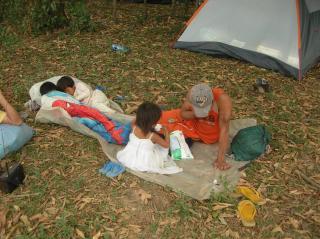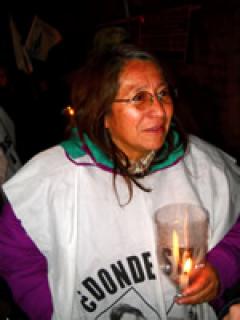UU Marches in Solidarity With Bolivian Indigenous Community
Since August 15, 2011, more than 1,500 Bolivian indigenous men, women, and children have embarked on a 350-mile trek, from the Amazonian lowlands of Trinidad to the highlands of La Paz, in opposition of a national highway construction project that would cut through a protected rainforest reserve while displacing indigenous communities, disrupting the delicate biodiversity of the region in the process.
Olga Flores Bedregal, who helped found a Unitarian Universalist congregation in La Paz, has joined the march in hopes of raising awareness around this month-long effort to protect the TIPNIS (National Park and Indigenous Territory Isiboro-Secure), as well as the mounting tension between indigenous populations and the Bolivian government.
She writes:
My dear Unitarian brothers and sisters , As stated by the song "Where is Love, There is God," today our divinity takes an indigenous face. Once again I invoke solidarity and support because we need to add voices to prevent the repression of the indigenous peoples of Bolivia and the deprivation of their lands, their rights, and their own philosophy of life. … …All that I am experiencing since I joined the March of the Indigenous Peoples is very intense. I am deeply moved, it makes me think, and above all it fills me with hope to see that the Indigenous People have much more life than I had thought; they resist the system, and keep other logic and ways of thinking, a wisdom that after 500 years we still don’t understand… …When we get up at 2, 3, or 4 in the morning and hear the children crying, when we watch them walk shoeless, we feel the price they are paying to preserve the forest and their way of life. We all feel it in our soul, mothers, fathers and relatives as we are called here in the March… …The obvious reason why we support the march is because on principle we believe that indigenous peoples have the right to live under their own standards and lifestyles; because of our reverence for life, we do not want to see the annihilation of endangered animals and plants from this region, or the world. But also, because behind the defense of indigenous peoples is the defense of their religion, their way of thinking and living life…"The Washington Post reports that construction of the highway may lead to the destruction of 2,300 square miles of rainforest by 2031 and may potentially open up the region to illegal logging and oil exploitation. President Evo Morales, considered a major supporter of indigenous rights and environmental protection, contends with striking the right balance between boosting his ailing economy via potentially lucrative development projects and remaining receptive to the concerns of the indigenous populations that this, and other projects of this ilk, would displace. According to reports from the BBC, Morales is committed to building the highway through the homelands of the Chiman, Yurucare, and Moxos Indian communities (affecting an estimated 12,000 people in total). A dialogue between the Bolivian government and indigenous leaders has yet to take place, though construction plans, currently underway, show no sign of halting.
Support the cause:
- Spread the word of this march. It’s happening right now and raising visibility around this conflict will help keep the Bolivian government accountable while lending support to the indigenous protesters.
- Sign this petition to President Evo Morales calling for the halt of the highway construction project through the TIPNIS rainforest reserve and demanding that his government respect the rights of the local environment and those of the indigenous peoples per the United Nations Declaration on the Rights of Indigenous Peoples (Bolivia was the first country to ratify this in 2008).
- Make a contribution to the protesters; contact Olga Flores Bedregal for more details.
Active in social justice work in Bolivia, Olga Flores Bedregal has been a key player in the struggle to have Bolivian Army records of human rights abuses made public, holding hunger strikes in 2010 and 2009 toward that end.


